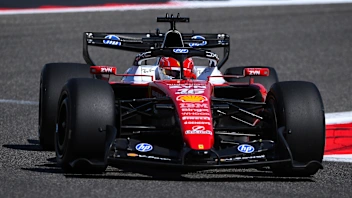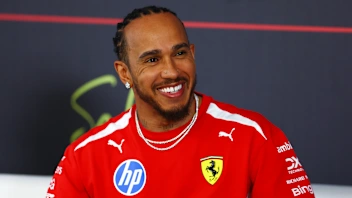Exclusive Q&A with Caterham's Finbarr O'Connell
Against the odds, the financially troubled Caterham team are back racing in Abu Dhabi this weekend having missed the last two rounds, thanks in part to a unique crowd-funding project. However, a new owner is what is needed if the team are to continue into the 2015 season. We caught up with the man charged with trying to secure Caterham’s future, interim team principal Finbarr O’Connell…
Q: Finbarr, it’s almost certainly the first time in Formula One history that an administrator is de facto team principal of a team. Can you talk us through the stages that led to this situation at Caterham?
Finbarr O’Connell: Well, it was three weeks ago that I spoke to all the employees about the situation. The factory was closed, they weren’t working and there was nobody to pay them. So I thought: what if we could find a way to bring the team to Abu Dhabi and show the world that it is still alive, that the team is still together? Then hopefully a purchaser would come along and buy the team, because they can see it operating. I suggested somebody else as team principal, but they said that I was the leader, that I have the financial abilities and that I should be the team principal.
Q: You’ve chosen a rather unusual way to fund a team…
FO’C: There was no money in the bank account so we thought that the fans would help - or the public reach out and help - and that translates into crowd funding. The web page was in operation within days and with the immense media coverage of that move we’ve managed to get the funds that brought us here. That was amazing!
Q: You are also quoted as saying that crowd funding is an emergency tool but not a way to fund a budget…
FO’C: Yes, it’s just an injection in the arm. Just to keep it going for a period of time, showcase it - and hopefully one of the potential purchasers is going to buy it.
Q: So what is it precisely that you expect from racing here in Abu Dhabi?
FO’C: I am talking to the potential purchasers, they are in the garage, and they are seeing the team - the commitment of the team. These people haven’t been paid since September. They are here unpaid and they are working together with me to rescue this team. It is fantastic to see this will to survive!
Q: Can you tell us the reasons people would want to buy this?
FO’C: Well, there are different scenarios: there is the license, and there are the team buildings. Of course the best option would be to sell both together, but there are also options for separate deals. I am talking to an organization that wants to buy the building, the equipment and the machinery and then they may think about developing a car over a year and apply for a new license.
Q: Right now the team is still together and functioning. How long do you think you can keep it together before everything is scattered to the wind?
FO’C: Within the next two weeks - because then the employees would have to look for other jobs. They would drift away - and if that happens that would mean the end of CaterhamF1. The sad thing is that the team wants to stay together.
Q: Can you say why the attempts of previous team bosses Albers, Ravetto and Kolles did not work out? Everybody thought that with their experience in keeping a team alive that it could work…
FO’C: This end of the grid costs £60-70 million a year to run - and you have to have that money. You only get a certain amount from sponsors and drivers - so you need serious sponsors or owners. To be honest, I haven’t really spoken to them in any depth - but they simply didn’t have that ability to bring these funds. They were probably looking for such people - but they definitely didn’t have it. And to quote Bernie Ecclestone, this is a business that costs - and if you cannot cover these costs don’t come into this business.
Q: You obviously had a look at the books. Was anything surprising to you? Is the business of running an F1 team very different to all the other enterprises you have worked on?
FO’C: Actually not. It is all about income and expenditure. You can control your expenditure to some extent, but you can’t control the income. You need to know that you have that income. If you know you need 60 million you have to know that this is coming in.
Q: Experts said that for their budget, the Caterham team was too big. Is that so?
FO’C: The number of employees has been decreased - but when I look down the pit lane other teams are much bigger. So it’s not the number of employees alone - it’s the bigger income line that allows you to have a bigger expenditure line. I think that in reality Caterham’s problem was not the costs but the income line. That was the issue.
Q: As an administrator you must have seen many businesses fail because the people who wanted to run that business dreamt up a situation that did not tally with reality. Is that the case with Caterham?
FO’C: Yes, I think there is a bit of truth in that. Some people want to be in Formula One and they will do anything to be in Formula One - and maybe they convince themselves that they can cover the costs. But you shouldn’t be struggling every month to pay the bills.
Q: From the brief taste that you’ve had of Formula One racing, can you understand that people can get carried away in wanting to be part of it at any cost?
FO’C: I can absolutely understand that. Maybe that is why there should be more leaders who are actually businessmen and who do not have octane in their blood.
Q: Let us assume that you find a buyer or sponsor. That will mean that they want to go racing next year. Is there a 2015 car?
FO’C: Yes, there is. And if something happens very fast the team will race next season. It might have trouble to go to Melbourne, but it will definitely have the capability to be on the grid next year. Right now the team is on the shelf - a functioning Formula One team - and I am instrumental in finding a new owner. Everything that comes after that - the drivers, a possible name change - is then up to them. That is not for me any longer. The best scenario for me is that I hand over my ‘team principal badge’ to a real Formula One team principal!
Next Up
Related Articles
/16x9%20single%20image%20-%202026-02-19T155002.636.webp) Antonelli ends Day 2 of second Bahrain test on top
Antonelli ends Day 2 of second Bahrain test on top  HighlightsCatch the action from Day 2 of the second Bahrain test
HighlightsCatch the action from Day 2 of the second Bahrain test Watch as F1 TV analyse Day 2 of second Bahrain test
Watch as F1 TV analyse Day 2 of second Bahrain test Leclerc leads Norris on first morning of final Bahrain test
Leclerc leads Norris on first morning of final Bahrain test Hamilton feeling ‘in the best place I’ve been for a long time’
Hamilton feeling ‘in the best place I’ve been for a long time’ Watch as F1 TV break down Day 1 of second Bahrain test
Watch as F1 TV break down Day 1 of second Bahrain test